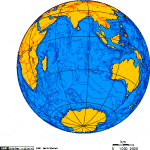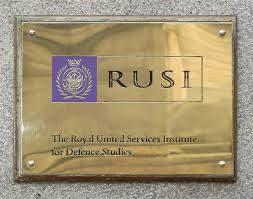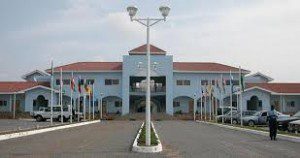 From the 17th to the 19th I attended the 40th conference of the British International Studies Association. With 700 participants it was the largest BISA conference so far. And with a location right next to Tower Bridge perhaps the one with the nicest view from the conference facilities. At the conference I presented at two roundtables which focused on the state of Security Studies and the rationale of the new European Journal of International Security (find a summary of the roundtables at the EJIS website here). In addition I also participated in a roundtable on Methods and Critique. Overall it was good to see a thriving British IR community in action. The discussion on methods and methodology continues to be one of the major themes the discipline is currently discussing, which is a move into the direction. What kind of social science IR and its many subcommunities wants to be is after all crucial a question of how it wants to combine theory and empirics and what types of empirical experiences enrich the formulation of theory and concepts.
From the 17th to the 19th I attended the 40th conference of the British International Studies Association. With 700 participants it was the largest BISA conference so far. And with a location right next to Tower Bridge perhaps the one with the nicest view from the conference facilities. At the conference I presented at two roundtables which focused on the state of Security Studies and the rationale of the new European Journal of International Security (find a summary of the roundtables at the EJIS website here). In addition I also participated in a roundtable on Methods and Critique. Overall it was good to see a thriving British IR community in action. The discussion on methods and methodology continues to be one of the major themes the discipline is currently discussing, which is a move into the direction. What kind of social science IR and its many subcommunities wants to be is after all crucial a question of how it wants to combine theory and empirics and what types of empirical experiences enrich the formulation of theory and concepts.
Author Archives: admin
The Anthropology of Internationalized Politics
 That Anthropology and International Relations (IR) share a range of common interests is increasingly becoming more obvious. In consequence there is a thriving debate about concepts, methods and empirical observations between both disciplines. A growing number of researchers adopts the ethnographic spectrum of methods to study internationalized politics, ranging from bureucracies such as the police, to development work or international organizations and global governance. On June 10-12th I attended a workshop hosted by the University of Bremen and held at the Hanse Wissenschaftskolleg in Delmenhorst in which a range of forthcoming studies at the intersection of anthropology and IR were discussed. The organizers phrased the rationale for the workshop well, when they argued that “The promise of an anthropology of internationalized politics then is that the enlarged empirical basis and an enlarged theoretical language would allow for new theoretical growth. It would be based on an enlarged empirical experience (Erfahrung) and not just derived from conceptual discussion alone or from theoretical deduction that are then checked against a mass of numerical data. Such a research approach would start out with an enlarged understanding of what empirical data is, and it would try to interpret it with an enlarged theoretical vocabulary.”
That Anthropology and International Relations (IR) share a range of common interests is increasingly becoming more obvious. In consequence there is a thriving debate about concepts, methods and empirical observations between both disciplines. A growing number of researchers adopts the ethnographic spectrum of methods to study internationalized politics, ranging from bureucracies such as the police, to development work or international organizations and global governance. On June 10-12th I attended a workshop hosted by the University of Bremen and held at the Hanse Wissenschaftskolleg in Delmenhorst in which a range of forthcoming studies at the intersection of anthropology and IR were discussed. The organizers phrased the rationale for the workshop well, when they argued that “The promise of an anthropology of internationalized politics then is that the enlarged empirical basis and an enlarged theoretical language would allow for new theoretical growth. It would be based on an enlarged empirical experience (Erfahrung) and not just derived from conceptual discussion alone or from theoretical deduction that are then checked against a mass of numerical data. Such a research approach would start out with an enlarged understanding of what empirical data is, and it would try to interpret it with an enlarged theoretical vocabulary.”
The Indian Ocean – One Region or many?
 The politics of maritime space is only rarely in the focus of international fora. Conferences devoted to the Indian Ocean region are a rare event, especially in Europe. On June the 9th the German ministry of Foreign Affairs in collaboration with the Friedrich Ebert Stiftung and the Robert Bosch Stiftung, organized a one day conference on the region. The conference was titled “The Indian Ocean: A Maritime Region on the Rise.” The background of the conference was that Germany’s foreign policy currently is in a phase of renewal. After decades of searching for Germany’s place in the world, the foreign office now wants to think foreign policy differently and aims to set new impulses, identify new themes and new spaces to strengthen international cooperation. Part of this innovation agenda, is Germany’s new focus on maritime security, as evidenced in the G7 declaration from earlier this year. Continue reading
The politics of maritime space is only rarely in the focus of international fora. Conferences devoted to the Indian Ocean region are a rare event, especially in Europe. On June the 9th the German ministry of Foreign Affairs in collaboration with the Friedrich Ebert Stiftung and the Robert Bosch Stiftung, organized a one day conference on the region. The conference was titled “The Indian Ocean: A Maritime Region on the Rise.” The background of the conference was that Germany’s foreign policy currently is in a phase of renewal. After decades of searching for Germany’s place in the world, the foreign office now wants to think foreign policy differently and aims to set new impulses, identify new themes and new spaces to strengthen international cooperation. Part of this innovation agenda, is Germany’s new focus on maritime security, as evidenced in the G7 declaration from earlier this year. Continue reading
Concepts at Work
Concepts are one of the main material of international politics, yet, often is the task to study them left to historians and political theorists. In order to correct that, the Workshop “Concepts at Work” (Jerusalem, 31.5-1.6.) intends to broaden the picture. Organized by Piki Ish Shalom from the Hebrew University of Jerusalem a rich set of studies on concepts such as self-determination, international community risk, sovereignty, or homeland will be discussed. At the workshop I will present a first sketch on the life of the concept of blue economy and how it has shifted meaning over the past 5 years. The workshop program is available here.
‘The Play of International Practice’ now online as first view
 A new article co-authored with Frank Gadinger which introduces international practice theory and offers some much needed clarification of its premises is now available as online first with International Studies Quarterly. The article is available as open access and can be downloaded here. The article is the outcome of a multi-year collaboration and summarizes a number of the core insights of our recently published book “International Practice Theory” (Palgrave MacMillan, 2014). Here is the article’s abstract:
A new article co-authored with Frank Gadinger which introduces international practice theory and offers some much needed clarification of its premises is now available as online first with International Studies Quarterly. The article is available as open access and can be downloaded here. The article is the outcome of a multi-year collaboration and summarizes a number of the core insights of our recently published book “International Practice Theory” (Palgrave MacMillan, 2014). Here is the article’s abstract:
“The core claims of the practice turn in International Relations (IR) remain ambiguous. What promises does international practice theory hold for the field? How does the kind of theorizing it produces differ from existing perspectives? What kind of research agenda does it produce? This article addresses these questions. Drawing on the work of Andreas Reckwitz, we show that practice approaches entail a distinctive view on the drivers of social relations. Practice theories argue against individualistic-interest and norm-based actor models. They situate knowledge in practice rather than “mental frames” or “discourse.” Practice approaches focus on how groups perform their practical activities in world politics to renew and reproduce social order. They therefore overcome familiar dualisms—agents and structures, subjects and objects, and ideational and material—that plague IR theory. Practice theories are a heterogeneous family, but, as we argue, share a range of core commitments. Realizing the promise of the practice turn requires considering the full spectrum of its approaches. However, the field primarily draws on trajectories in international practice theory that emphasize reproduction and hierarchies. It should pay greater attention to practice approaches rooted in pragmatism and that emphasize contingency and change. We conclude with an outline of core challenges that the future agenda of international practice theory must tackle.”
Maritime Security Roundtable at RUSI
 Yesterday afternoon I attended a maritime security roundtable at the Royal United Services Institute(RUSI) in London. RUSI has recently taken over a European Commission funded project, CRIMSON, which monitors and supports four projects that are part of the Critical Maritime Routes Programme. The goal of the workshop, which was attended by various representatives from the London based maritime security community, was to give the CRIMSON project team a better understanding of UK perspectives on maritime security and develop proposals of what the EU could do differently.
Yesterday afternoon I attended a maritime security roundtable at the Royal United Services Institute(RUSI) in London. RUSI has recently taken over a European Commission funded project, CRIMSON, which monitors and supports four projects that are part of the Critical Maritime Routes Programme. The goal of the workshop, which was attended by various representatives from the London based maritime security community, was to give the CRIMSON project team a better understanding of UK perspectives on maritime security and develop proposals of what the EU could do differently.
Meeting the US Ambassador in Cardiff
 Yesterday I had the pleasure to meet the US ambassador to the UK, Matthew W Barzun. Mr. Barzun was visiting Cardiff and gave a lecture at the Department of Politics and International Relations. In a well staged performance he mainly focused on the question whether the U.S. is doing enough in world politics or should get more actively involved in today’s conflicts.
Yesterday I had the pleasure to meet the US ambassador to the UK, Matthew W Barzun. Mr. Barzun was visiting Cardiff and gave a lecture at the Department of Politics and International Relations. In a well staged performance he mainly focused on the question whether the U.S. is doing enough in world politics or should get more actively involved in today’s conflicts.
1st XMU-Cardiff Symposium on Maritime Security
![IMG_1129[1]](https://bueger.info/wp-content/uploads/2015/05/IMG_11291-300x225.jpg) As part of the visit of the Department of Politics and IR to our partner university in Xiamen, we held the first XMU-Cardiff Symposum on Maritime Security. The objective was to share Chinese and European perspectives on the challenges of maritime security, how can they be theorized, and how the challenges that arise in the South China Sea in particular can be managed. The first section of the event investigated maritime security from a birds eye perspective in explore the role of justice, power and history in understanding contemporary maritime security relations. This was followed by a section that aimed at conceptualizing the concept of maritime security and its links to human security as well as disputes and fishery conflicts. The following section zoomed in on a range of cases, including the paralells between african maritime security cooperation and Asian, and the importance of bilateralism in addressing the disputes in the South China Sea. Taking together the symposium revealed, firstly, the importance for devoting more intellectual attention to maritime security and the importance that the maritime will hold in the 21st century. Secondly, the symposium documented how productive it is to leave a euro-centric perspective and scrutinize maritime security from a broader perspective which takes into account different intellectual traditions, disciplines as well as combinin theory with detailed empirical knowledge.
As part of the visit of the Department of Politics and IR to our partner university in Xiamen, we held the first XMU-Cardiff Symposum on Maritime Security. The objective was to share Chinese and European perspectives on the challenges of maritime security, how can they be theorized, and how the challenges that arise in the South China Sea in particular can be managed. The first section of the event investigated maritime security from a birds eye perspective in explore the role of justice, power and history in understanding contemporary maritime security relations. This was followed by a section that aimed at conceptualizing the concept of maritime security and its links to human security as well as disputes and fishery conflicts. The following section zoomed in on a range of cases, including the paralells between african maritime security cooperation and Asian, and the importance of bilateralism in addressing the disputes in the South China Sea. Taking together the symposium revealed, firstly, the importance for devoting more intellectual attention to maritime security and the importance that the maritime will hold in the 21st century. Secondly, the symposium documented how productive it is to leave a euro-centric perspective and scrutinize maritime security from a broader perspective which takes into account different intellectual traditions, disciplines as well as combinin theory with detailed empirical knowledge.
Department visits Xiamen University
Next week I will join a small delegation of my home department on its visit to Xiamen University (XMU). XMU is our partner university and we are visiting our collegues in the School of International Relations. Like Cardiff also XMU has rich expertise in maritime security, which is the theme we will be discussing. We will also be exploring ways of further intensifying the collaboration.
First meeting of West African Security Research Network in Accra
 From 28-30 April 2015 I will participate in the symposium on „The Regional Dynamics of Peace and Security in West Africa“. The event is organized by the Center for European Integration Studies (ZEI) at the University of Bonn, Germany, the West Africa Institute (WAI) in Praia, Cabo Verde, the Centre for European and International Studies Research (CEISR) at the University of Portsmouth, UK, and the Raoul-Dandurand Chair of Strategic and Diplomatic Studies, Université du Québec à Montréal, Canada. It will take place at the premises of the Kofi Annan International Peacekeeping Training Centre (KAITPC) in Accra, Ghana. The objective of the event is to strengthen the network of local and international scholars working on security issues in Western Africa. At the conference I will present our ongoing work on maritime security cooperation in the Gulf of Guinea and the effects of the 2014 Yaounde Code of Conduct.
From 28-30 April 2015 I will participate in the symposium on „The Regional Dynamics of Peace and Security in West Africa“. The event is organized by the Center for European Integration Studies (ZEI) at the University of Bonn, Germany, the West Africa Institute (WAI) in Praia, Cabo Verde, the Centre for European and International Studies Research (CEISR) at the University of Portsmouth, UK, and the Raoul-Dandurand Chair of Strategic and Diplomatic Studies, Université du Québec à Montréal, Canada. It will take place at the premises of the Kofi Annan International Peacekeeping Training Centre (KAITPC) in Accra, Ghana. The objective of the event is to strengthen the network of local and international scholars working on security issues in Western Africa. At the conference I will present our ongoing work on maritime security cooperation in the Gulf of Guinea and the effects of the 2014 Yaounde Code of Conduct.